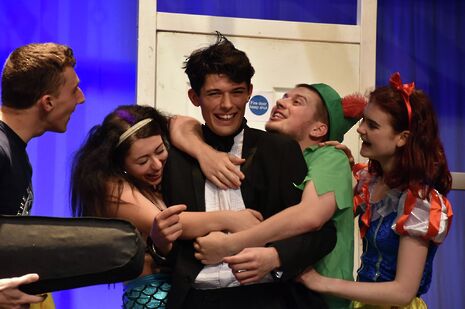Review: BOYS
“This production offers a window into the complex, brilliant, and ultimately tragic lives of six young people that was exceptionally well realised on the stage of the ADC,” writes Tristan Selden

This production offers a window into the complex, brilliant, and ultimately tragic lives of six young people that was exceptionally well realised on the stage of the ADC. The sense of immersion that pervaded my experience of this play was felt from the beginning thanks to the very strong accent work across the board and Ciaran Walsh’s brilliant realisation of the busy, chaotic, grimy kitchen-room set out in Hickson’s script.
The clear distinctions between Tom Taplin’s soft Edinburgh accent, the gruffer tones of Adam Mirsky’s Scottish accent, and Conor Dumbrell’s lilting County Durham all served to imbue a sense of regional place to this co-inhabited student flat in Edinburgh.
The larger than life character of Mirsky’s Timp was communicated immediately by his entry in the clothes which remain to him after what turns out to have been a wild party the night before. Here, as at several moments throughout, the costume design takes Hickson’s instructions to another level to great comic effect as Mirsky enters not only with the prescribed ‘spank’ written across his boxers in tip-ex and eye patch over one eye, but also sporting a down-turned pirate hat that played into the wonderful physicality Mirsky gave to the part and elicited the first of what would be many rounds of laughter from the audience.
Walsh’s set really created sense of a space that was lived in: the open walls let you see into the confined space of the flat and made the audience aware of movement and action occurring outside of the kitchen but at the same time managed to convey a sense of containment and claustrophobia that became more strongly felt as mountains of bin bags filled the stage in the third act, although thankfully the technical director saw fit to refrain from emulating the smell of thirty or so ripe and ready rubbish bags.
“The sense of immersion that pervaded my experience of this play was felt from the beginning”
Although at his first entry Louis Norris’s Mack felt awkward and uncomfortably lacking in motion on stage, over time this relaxed nonchalance was clearly intended to inform a sense of a very different character to those of the other Boys; played with a nihilistic detachment, the skill required to feel this awkward on stage was made clear in the few moments later in the play in which the character Mack acts with some compassion, especially in his interactions with Jessica Murdoch’s Sophie. Here Norris gave a performance that gave the audience a real sense of the complicated nihilist that both cares about Sophie and yet struggles or refuses to show his feelings in all but the briefest of moments.
Dumbrell’s Benny, in many ways the character at the heart of this piece, was brought to life with a real emotional maturity, creating a clear and consistent characterisation of a more restrained, sweet and intellectual boy, with Dumbrell flawlessly mixing together the moments of shy, vulnerable reservedness with Benny’s forays into the laddish behaviour of the other boys.

While every character had a clear, well developed and believable relationship with each of the other characters, Maya Yousif and Adam Mirsky’s relationship probably struck me as the most earnest and believable: their dialogue when laid in each other’s arms on the sofa near the beginning of the second act was really very endearing, the two of them achieving an intimacy on stage that felt comfortable and true to life.
The central drama deals with the inability, or ineffectiveness of these six young people to move on with their lives in the aftermath of both the four year period they have spent living with each other and the one tragic event in particular that binds them all together. This production deals with the issues of mental health, sexual infidelity, suicide, and violence with great maturity and a degree of solemnity that one might not at first have expected from the comedic interactions of the first half of the play.
“It is a delightful, humorous, and heartfelt reflection on student life, the effects of suicide, and that part of the human condition that refuses to accept change”
When music was used diegetically it worked to great and various effects: at moments it synthesised with energetic dancing on stage to draw the audience in, almost uncomfortably loud during one sequence, in another the delicate balance of speech on stage and music meant that only snatches of dialogue were able to be heard- this was not to the detriment but rather benefit of the drama as it created a sense of realism as if one were attending the noisy party viewing from a corner seat. The only time at which the sound design was a little grating was when it was repeatedly used to mask the noise or advance time during set changes. Most of the time this worked very effectively, but there were moments when the choice and reason for this music felt less considered and served to bemuse and distance the audience rather than support the sense of time and space as it did most of the time.
Whilst the stage was lit almost entirely naturalistic throughout, certain moments of violence and drama were felt most strongly because of well timed and explosive sound and lighting effects. Unfortunately there was a small technical hiccup in the first few moments after the interval, but to their credit, both Taplin and Dumbrell who were on stage at the time carried on their dialogue upstage as if nothing were happening, despite the muffled giggling of the audience.
If you can get a ticket for any of the remaining performances of this show I would highly recommend that you do: it is a delightful, humorous, and heartfelt reflection on student life, the effects of suicide, and that part of the human condition that refuses to accept change. Boys (or girls, or children) will be boys, and maybe none of us will ever truly stop being boys
 Comment / Plastic pubs: the problem with Cambridge alehouses 5 January 2026
Comment / Plastic pubs: the problem with Cambridge alehouses 5 January 2026 News / News in Brief: Postgrad accom, prestigious prizes, and public support for policies11 January 2026
News / News in Brief: Postgrad accom, prestigious prizes, and public support for policies11 January 2026 Theatre / Camdram publicity needs aquickcamfab11 January 2026
Theatre / Camdram publicity needs aquickcamfab11 January 2026 News / Cambridge academic condemns US operation against Maduro as ‘clearly internationally unlawful’10 January 2026
News / Cambridge academic condemns US operation against Maduro as ‘clearly internationally unlawful’10 January 2026 Comment / Will the town and gown divide ever truly be resolved?12 January 2026
Comment / Will the town and gown divide ever truly be resolved?12 January 2026








